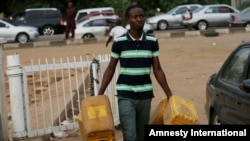Already feeling the pinch from slumping oil prices and slowing economic growth, Nigerian companies are finding it increasingly hard to get hold of
foreign currency due to central bank restrictions and may struggle to repay their debts.
Yields on a number of dollar corporate bonds have risen close to record highs this week, reflecting investors' anxiety despite an assertion by Nigeria's richest businessman that no borrower will default due to the currency shortage.
Since 2007, Nigerian financial and energy firms such as FBN Holdings and Seven Energy have issued more than $5 billion of dollar-denominated debt on international capital markets, including almost $3 billion in Eurobonds since the
start of 2014, according to Thomson Reuters data.
But storm clouds have been gathering over Africa's top oil exporter and biggest economy as benchmark crude has again fallen below $50 a barrel, less than half the mid-2014 level.
Plunging energy revenues, which make up 70 percent of government income and 90 percent of foreign currency earnings, have hit public finances and the naira. It has lost around 15 percent in the past year, with devaluations in November and February before Nigeria pegged the national currency.
Companies across the board have started feeling the dollar shortage due to restrictions imposed by the central bank to halt the naira's fall and preserve its foreign currency reserves.
The foreign currency rationing is hurting.
"This is an enormous problem for the organizations ... which have issued Eurobonds but also some of the more local corporates who are in the manufacturing business, trying to access dollars to get the interest payments made on time," said Angus Downie, head of economic research at regional lender Ecobank.
"If the oil price does not rise soon for some companies that have borrowed in dollars, they will struggle to make payments and the end result would be that they would have to default," he added.
When the U.S. Federal Reserve finally raises its Fed funds rate - effectively the base rate underpinning borrowing costs around the world - the burden will increase yet further for Nigerian borrowers.
The Fed may start ending the era of ultra low interest rates as soon as Thursday, hurting all the emerging market companies that loaded up with cheap debt during the past seven years.
Buhari's vacuum
Foreign bond and equity investors are also fretting over a policy vacuum as President Muhammadu Buhari has yet to appoint a cabinet or economic team more than three months after he took office. They are ever more reluctant to put money into Nigeria.
In another sign of investor frustration, JP Morgan said last week it would remove Nigeria from its influential Emerging Markets Bond Index (GBI-EM) due to a lack of liquidity and the currency restrictions - a move that might prompt more capital outflows and increase costs to borrow abroad.
Yet Aliko Dangote, Nigeria's most prominent businessman and Africa's richest man, who produces anything from spaghetti to cement, disagrees. He told Reuters that those "looking for dollars to pay interest will get it from the central bank".
"I have not seen anybody who has defaulted on the paying of interest. It won't happen," said Dangote, giving his backing to central bank restrictions that have been unpopular with those who have struggled to secure dollars needed to import goods.
Rising yields
Yields for corporate dollar-denominated issues reflect the rising premium investors demand to hold Nigerian debt.
Access Bank's seven-year Eurobond issued in June 2014 yielded 14.8 percent on Wednesday, hovering just below a five-month-spike hit earlier in September.
Fidelity's four-year Eurobond changed hands with a yield of 14.879, just off a record high hit on Tuesday.
The only international debt issue this year was made in April by Lagos-based development financier Africa Finance Corp.
The squeeze on the financial sector is also worrying policymakers. Minutes from the last meeting of the central bank's monetary policy committee shows that one member, Adedoyin Salami, voiced concerns about a "disconcerting rise" in the number of non-performing loans in the banking sector.
"So far the central bank has in principle enough ammunition to deal with this risk," said Samir Gadio, Standard Chartered's Head of Africa Strategy, adding that the difficulties were probably more with loans and dividend payments abroad than with Eurobonds.
Reserves have fallen by 9 percent since the start of the year.
The latest data on Wednesday showed they have dropped almost three percent in the past month, leaving them down more than 22 percent in the past 12 months.
Most investors are expecting the naira to be devalued another 10-15 percent. However, Buhari spoke out against this on Wednesday.
Buhari aims to appoint his cabinet this month and has promised to diversify the economy from oil, but has not announced any firm plans or commented publicly on the dollar shortages.
The policy vacuum was felt in the interbank market this week. Traders said banks refused to make bids until authorities clarified how a new system would work under which all government revenues should go into a single central bank account, part of Buhari's drive to fight corruption.
Bismarck Rewane, chief executive of Lagos-based consultancy Financial Derivatives, said Nigerian banks and firms were still able to keep up with interest payments and he expected the central bank would probably relax the rules at some point.
But the dollar shortage will hit businesses as they need to take on more loans at local banks in order to spend more on imports.
"Some companies are going to die," Rewane said. "Typically, there will be around five or 10 percent of companies that will be in jeopardy."





